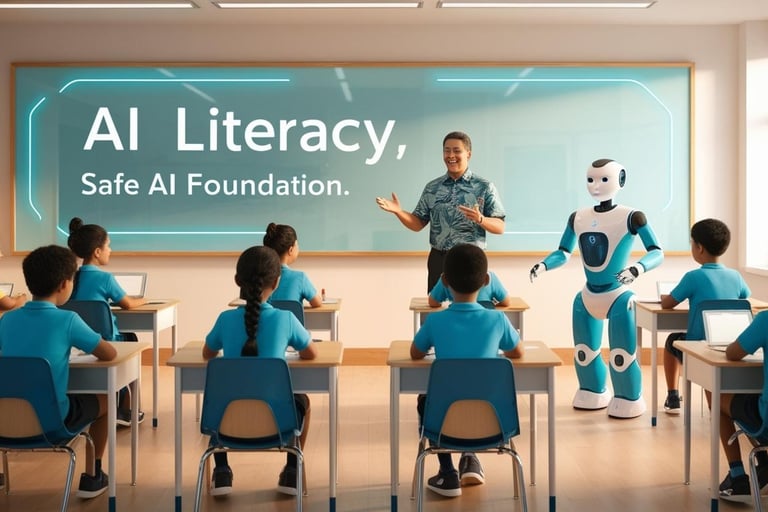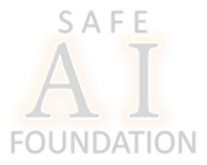AI Digest
JULY 2025
~ ~ \\ // ~ ~


AI and K12 Education
Author:
Sandeep Shekhawat
AI has already made its way into classrooms both in schools and in colleges. While universities are cracking down on the use of AI for homework and assessments, elementary school’s use of AI can genuinely help teachers and students to effectively learn new things. AI can significantly enhance elementary education by personalizing learning, improving accessibility and even streamlining some of the administrative work in schools’ offices and districts.
1. Use of AI as a Learning Tool:
Leveraging AI for personalized learning can help teachers create a curriculum for students which can be based on individual needs and tailored for their past performance. Adaptive learning systems can also adjust content real time to make content delivery more personal and match the learning pace of the students. This is not unique to GenAI models and has been used by apps like Grammarly, and Duolingo for few years.
With new AI-based coding tools available for code generation like Claude AI and tools like Replit for deployment, designing to building apps cuts down the software development process. Such tools can put power in the hands of the teachers who might not be software developers but might have ideas to test their students and to try out different ways of learning based on the grades.
AI can also be used to create interactive and immersive learning environments through VR and XR applications. AI-powered educational games and simulations can make learning fun, engaging specially for subjects like science, history and geography.
2.Use of AI for Teaching Support and Improved Efficiency:
AI can automate tasks like grading, scheduling and lesson plan creation, creating more free time for teachers to spend time on other ideas. AI Powered tools already exist like Magic School AI or other browser-based agentic tools, which can learn ways of their working, automate routine tasks and provide personalized support to teachers.
Examples of AI in K-12:
· Hillsborough County school district uses AI powered tools like Amira learning and Magic School AI for teacher support.
· Cupertino School district has been piloting tools like Magma Math, and Khanmigo for math learning.
· Philadelphia and Los Angeles Unified schools are using AI Chatbots for parent communication and automating operational tasks in their offices.
3. Challenges and Considerations:
· US Department of Education's Leadership: Not all school districts and not equal. Some have more resources to fund such programs vs others. The SAFE AI Foundation 's recommendation is to have US Department of Education provides a minimum guideline on the use of AI across all public schools and provides adequate funding to enable such programs.
· Adequate teacher training and support: Leveraging AI to support and bring all teachers up to speed on AI use will help drive adoption and use of AI in schools from classrooms to admin offices. Safe AI recommendation is for school districts to select the right tools based on their needs and create a dedicated training program for teachers and support staff.
· Does the use of AI tools for writing, learning and research make students more dependent on AI and less prepared for the industry, university research or reduces their critical thinking ability? Research shows that there is an overall positive impact on student’s abilities, if they apply evidence-based reasoning to the decision making.
· Concerns around Privacy and Bias in AI systems: Any hyper personalization needs data. Data breaches and biases in AI continue to happen despite the data privacy governing laws like FERPA, COPPA. The SAFE AI Foundation's recommendation is for strict policies and guidelines on how the data should be collected, stored, used in new age AI models and tools.
REFERENCES
[1] NSF Ideas for AI in Education https://www.nsf.gov/science-matters/ai-education-ai-education
[2] SAFE AI foundation, "AI Manifestation Unfolded", https://safeaifoundation.com/vip-preview
[3] "AI’s effects on students critical thinking", https://slejournal.springeropen.com/articles/10.1186/s40561-024-00316-7
[4] Family Educational Rights and Privacy Act - FERPA Policy, https://studentprivacy.ed.gov/ferpa
[5] Children Online Privacy Protection - COPPA Policy, https://www.ftc.gov/legal-library/browse/rules/childrens-online-privacy-protection-rule-coppa
[6] Hillsborough use of AI in School district, https://www.wtsp.com/article/news/education/alpha-school-ai-learning-tampa/67-649af75c-c244-491f-abf5-dff92a6a9a05
[7] The Future of Child Development in the AI Era, see https://everyone.ai/wp-content/uploads/2024/08/EVAI_Executive-Summary_RR_ENG.pdf
[8] The Baby Brain by Pat Kuhl https://www.youtube.com/watch?v=ErPPXfsY6a8
Disclaimer: The information in this digest is provided “as it is”, by the SAFE AI FOUNDATION, USA. The use of the information provided here is subject to the user’s own risk, accountability, and responsibility. The SAFE AI FOUNDATION is not responsible for the use of the information by the user.
Notes: The SAFE AI Foundation is a non-profit organization registered in the State of California and it welcomes inputs and feedback from readers and the public. If you have things to add concerning AI in Education or would like to volunteer, please email us at contact@safeaifoundation.com


